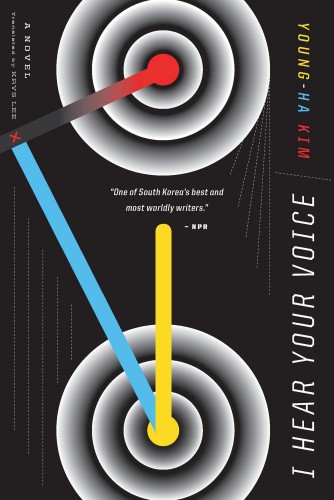
I Hear Your Voice
کتاب های مرتبط
- اطلاعات
- نقد و بررسی
- دیدگاه کاربران
نقد و بررسی

June 5, 2017
The plight of an orphan whose teenage mother disappears after giving birth to him in a bus terminal bathroom sets off Kim’s dark tale about teenage gangs and the underside of Korean city life. The orphan, Jae, taken in at birth by a flower shop owner, befriends Donggyu, a young boy about his age with functional aphonia. They form a connection as Jae is able to give voice to Donggyu’s needs. The two eventually lose touch and reconnect as young teenagers when Jae is living hand to mouth, having escaped first his adoptive mother’s meth addiction and then a run-down orphanage where the children aren’t treated much better than the caged dogs of a nearby breeder. Jae gets involved with motorcycle gangs and becomes one of their leaders. Donggyu, though still a teenager, leaves the comforts of home to join him, and his feelings about Jae, which waver from adoration to murderous jealousy, are vividly portrayed. Once a motorcycle cop is introduced to the story, Kim explores the cop’s assaultive behavior with young men who routinely break the law, underscoring their difficult circumstances. In a final chapter, the author reveals how he met the actual Donggyu and heard about his friend, Jae, and subsequently decided to write a novel inspired by their lives. Kim casts an unwavering spotlight on the gritty street life of teenagers, capturing their angst, ennui, and vulnerability.

May 1, 2017
A pair of alienated, hypersensitive South Korean boys seek solace, first from each other and then from the volatile subculture of their homeless, aimless peers.Kim (I Have the Right to Destroy Myself, 2010, etc.), a prolific and eclectic Korean novelist, has found artistically fertile ground in the broken lives of his country's misfits. And it would be difficult to imagine two more marginalized protagonists than Jae and Donggyu. Jae, born in Seoul's Express Bus Terminal to a homeless teenager, is destined from the start to repeat his mother's fate. A few years later, Jae, who's been adopted by a "hostess club" kitchen employee, meets Donggyu, the son of a police detective, and they forge a lifelong bond. Jae is the only person who can communicate with Donggyu, who for years will not say a word to anyone. Jae's ability to be "the interpreter" of Donggyu's desires foretells psychic gifts that help him not only survive, but prevail when he's compelled to forage through the city's meaner streets of criminals, prostitutes, and teen runaways. Though Donggyu eventually shows his ability to speak, he remains more a watchful listener as he witnesses Jae's transition from grubby, emaciated street rat to charismatic leader of one of the many motorcycle gangs racing and roaring with aimless swagger through the city's streets. The source of Jae's power seems to be his omnidirectional empathy not merely with people, but with animals, plants, and even inanimate objects. ("If a being experiences extreme suffering, I feel it, too," he says.) Donggyu, being the first to recognize Jae's gifts, eventually becomes a motorcyclist himself, investing his less messianic but just as intense degree of empathy into the other wayward youths drawn into Jae's circle. Like the shifting gears of an engine, Kim's narrative changes perspectives from Donggyu's first-person recollections to wide-screen omniscience to the point of view of an enigmatic police officer and even to that of the author himself, following a climactic motorcycle rally whose stunning denouement leaves behind many more questions than answers. The story's transitions aren't always navigated as deftly as Kim intends. But his own empathetic gifts applied toward even the quirkiest and seediest of his characters evoke a vivid panorama of what life along the edges is like in Seoul.
COPYRIGHT(2017) Kirkus Reviews, ALL RIGHTS RESERVED.

June 1, 2017
In the West, K-pop, K-drama, and Gangnam Style are synonymous with contemporary South Korea. Less well known is an underbelly class of street youth, battling abandonment, brutality, and worse. Kim (Black Flower, 2012), one of Korea's most lauded writers, takes readers into Seoul's grittiest corners, beginning in a bus terminal bathroom stall where a teenager gives birth alone. The baby, Jae, is initially well cared for by a stranger, until drugs rob him of any semblance of family connections. Jae eventually escapes a remote orphanage to return to Seoul's streets, reemerging as an ascetic surviving on handfuls of uncooked rice. His ascent among the city's motorcycle gangs is revealed through multiple perspectives, including a once-mute childhood friend, a girlfriend of sorts, and a police officer-sexual predator. Near the book's conclusion, Kim inserts himself via a meta-addendum explaining how Jae's story became his latest fiction. Elegantly rendered into English by Lee, author of How I Became a North Korean (she is also translating Kim's next novel), this is a wrenching examination of discarded youth, abuses of power, and the irreparable disintegration of societal structures.(Reprinted with permission of Booklist, copyright 2017, American Library Association.)

























دیدگاه کاربران